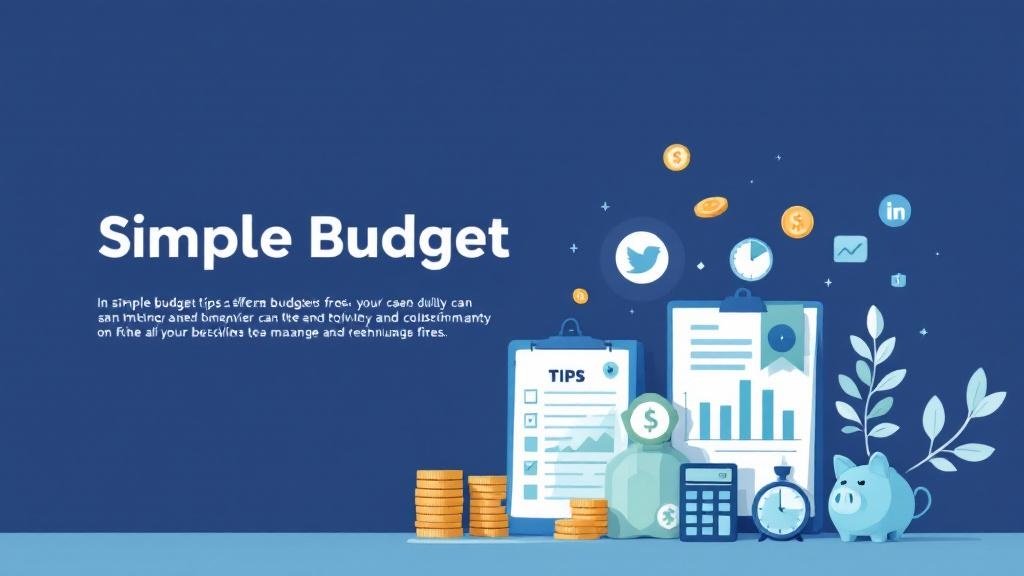Managing money doesn’t have to be complicated. Whether you’re just starting out with your finances or you’re a seasoned budgeter looking for new ideas, having a solid budgeting strategy is crucial for financial success. But what if you’re looking for simple budget tips to make managing your money feel less like a chore? You’re in the right place.
In this guide, we’ll dive into some simple budgeting methods that anyone can follow. Whether you’re a beginner or an experienced budgeter, these easy budget tips can help you take control of your finances, save more, and reduce unnecessary expenses. We’ll also provide practical budgeting tips for busy people and show you how to get started with personal finance tips that can work for anyone.
Let’s get into it.
What Are Simple Budget Tips?
Before we dive into the specifics, let’s take a moment to define what we mean by simple budget tips. These are actionable, straightforward strategies that you can follow to organize your finances, track your spending, and ensure you’re putting your money where it matters most. The best part? They don’t require a degree in finance or hours spent poring over spreadsheets.
Simple budget tips are designed to make managing money easy and stress-free. Whether you’re a student, a parent, or someone just trying to save more, these tips can help you stick to your financial goals.
Simple Budgeting Methods: Where to Start
1. Track Your Expenses
One of the easiest and most effective budgeting tips for beginners is simply keeping track of where your money is going. You might be surprised at how much you spend on things you don’t really need.
Start by reviewing your bank statements, credit card bills, and receipts to get a clear picture of your monthly expenses. Identify where you can cut back, like those daily coffee runs or unused subscriptions. Once you see where your money is going, you can make quick budgeting strategies to reduce unnecessary costs.
2. Use the 50/30/20 Rule
The 50/30/20 rule is a classic budgeting method that’s perfect for beginners and anyone looking for simple money management tips. Here’s how it works:
-
50% for Needs: This includes rent, utilities, groceries, transportation, and anything else essential to your day-to-day life.
-
30% for Wants: Things like dining out, entertainment, and travel fall under this category.
-
20% for Savings and Debt Repayment: The remaining 20% should go toward savings, emergency funds, or paying down debt.
By following the 50/30/20 rule, you can quickly categorize your spending and see how much you have left over for savings or reducing debt.
Simple Budgeting Tips for Busy People
Life can get hectic, and sometimes it feels impossible to sit down and work through a detailed budget. But with these minimalist budgeting tips, you can keep your finances in check without spending too much time on them.
3. Automate Your Finances
If you’re always on the go, one of the best easy budget tips is automation. Set up automatic transfers to your savings account or retirement fund each month. You can also automate your bills, so you don’t have to worry about missing a payment or late fees.
By automating these transactions, you’re ensuring that you’re saving consistently and staying on top of bills without having to think about it.
4. Use Budgeting Apps
There are tons of budgeting made easy apps out there designed to help you keep track of your finances. Some of the most popular options include:
-
Mint: This free app tracks your spending, helps you set budgets, and gives you a snapshot of your financial situation.
-
YNAB (You Need a Budget): Great for those who want a more hands-on approach, YNAB helps you prioritize your spending and set specific goals.
-
PocketGuard: This app helps you track your spending and offers suggestions on how much you can afford to spend based on your budget.
These apps can save you time and effort by doing much of the heavy lifting for you.
How to Budget Effectively: Tips for Saving More
Now that we’ve covered some of the basics, let’s explore how you can implement some effective budgeting strategies to save more money and reduce unnecessary spending.
5. Set Clear Financial Goals
If you’re not sure where to start, it’s essential to set clear financial goals. Ask yourself: What do you want to achieve with your money? Whether it’s saving for a vacation, building an emergency fund, or paying down debt, having a goal will help you stay motivated and on track.
Your goal should be specific, measurable, attainable, relevant, and time-bound (SMART). For example, “I want to save $5,000 in six months for an emergency fund” is much more effective than simply saying, “I want to save money.”
6. Cut Back on Unnecessary Expenses
One of the best ways to save money easily is by cutting back on things you don’t need. This doesn’t mean you have to deprive yourself; it’s about making conscious decisions about where your money is going. Consider:
-
Canceling subscriptions you don’t use (streaming services, gym memberships, etc.).
-
Cooking at home more often rather than eating out.
-
Buying generic brands instead of name-brand products.
These small changes can make a significant difference in your monthly budget.
7. Create a Monthly Budget Plan
A solid monthly budget planning routine is key to staying on top of your finances. Set aside time at the beginning of each month to review your income, expenses, and savings goals. Then, plan your spending accordingly.
A well-structured budget will help you avoid impulse purchases and ensure that you’re living within your means.
FAQs About Simple Budget Tips
1. What is the best budget for beginners?
For beginners, the 50/30/20 rule is one of the easiest and most effective budgeting methods. It helps you divide your income into three main categories: needs, wants, and savings. It’s a simple way to manage your finances without overcomplicating things.
2. How can I save money on a tight budget?
Saving money on a tight budget starts with cutting back on non-essential expenses. Look for subscriptions or services you don’t use, cook more meals at home, and prioritize needs over wants. Use budgeting apps to track your progress and ensure you’re staying on track.
3. What are the best budgeting tips for busy people?
For busy people, automating bills and savings, as well as using budgeting apps, can save you time and energy. Apps like Mint and YNAB help you stay organized without needing to spend hours managing your finances.
4. How can I make budgeting fun?
Budgeting doesn’t have to feel like a chore. You can make it fun by setting challenges or rewards. For example, challenge yourself to save a certain amount every month and treat yourself to something small when you hit your goal. Gamifying your budgeting can make the process more enjoyable.
5. What’s the easiest way to budget effectively?
The easiest way to budget effectively is to keep it simple. Use the 50/30/20 rule, track your spending, and automate your savings. Keeping things straightforward and consistent is the key to long-term financial success.
6. How can I reduce my monthly expenses?
To reduce monthly expenses, review your spending habits and look for areas where you can cut back. Cancel unused subscriptions, buy in bulk, and be mindful of impulse purchases. Even small changes can add up to significant savings over time.
7. What are minimalist budgeting tips?
Minimalist budgeting is about simplifying your spending and focusing on what truly matters. This means cutting out unnecessary purchases and focusing on your essential needs and long-term goals. Think of it as reducing financial clutter for a clearer, more focused financial life.








Comments (0)